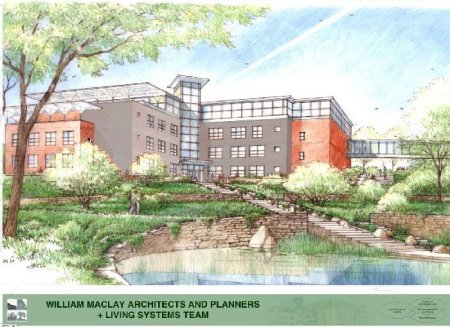 |
| National Trust for Historic Preservation |
Next we heard from Betsy Rosenbluth, Coordinator of the Burlington Legacy Project's sustainable city initiative for Burlington. This initiative stimulates development and revitalization through community involvement and opportunity for all ages and incomes. To achieve these goals, the Legacy Project promotes home ownership, full community participation in decision-making, sharing of the benefits and burdens of community growth, innovative housing and transportation solutions, environmental stewardship, and food security.
Later, Brenda Torpy got everyone fired up for the Burlington Community Land Trust's (BCLT)mission of incorporating environmental friendliness with affordable housing in the community. The BCLT sees home ownership as a goal that should be obtainable for everyone. They work to help people achieve ownership while improving the health of communities and fighting the prejudice against affordable housing.
To round off our morning, Nancy Williams, executive director of Preservation Burlington, described Burlington's history and took us on a walking tour of the downtown area. Preservation Burlington works as an educational and advocacy forum to help citizens understand Burlington's history to balance growth and preservation as they face the tough issues such as sprawl, density, green space, lack of middle range housing, and competition for land.
 |
| City of Burlington |
After lunch we participated in a panel on regional planning run by Austin Troy, a professor at the Rubenstein School. The panel included Dan Seneca-Albrecht, the Special Projects Planner for the Chittenden County Regional Planning Commission, who provided insight on how his organization works with the communities of Chittenden County to develop a regional plan and deal with issues such as sewage treatment, stormwater management, and emergency management planning. In addition, Miro Weinberger, a developer from the Hartland Group, explained the positive role that developers can play in creating smart, sustainable development. The third panelist, Senator Ginny Lyons, the Chair of the Senate Natural Resources Committee, provided insight into the political framework that regulates development in Chittenden County. For additional information see www.cnu.org.
All of the parties included in this panel expressed a collective interest in preserving the integrity of Vermont while meeting the demands of a growing population and economy. They stressed the importance of people, communities, and government working together towards a future of smart growth. The panel inspired us to consider a number of questions, including:
- How should planners balance economic and social needs with environmental concerns?
- What incentives can be provided to developers to encourage sustainable development?
- How can communities better work with one another to develop a regional plan for development and conservation?
- How can we add “teeth” to regional plans?
 |
| UVM |
Further Questions Inspired by the Day's Events:

 Mt. Mansfield
Mt. Mansfield